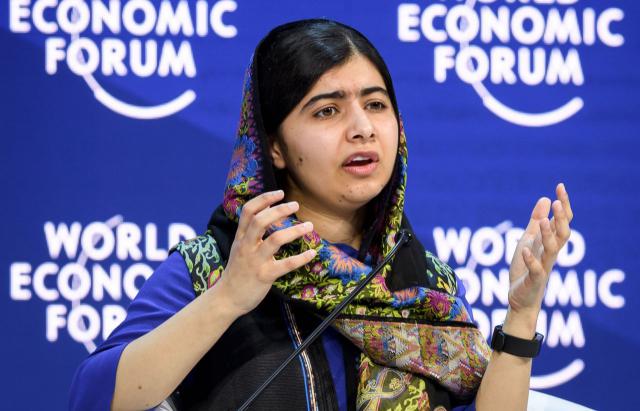Malala talks about her journey to feminism, shares message for Trump on women’s rights

PAKISTANI NOBEL PEACE PRIZE MALALA YOUSAFZAI GESTURES WHILE TALKING DURING A SESSION AT THE ECONOMIC FORUM (WEF) ANNUAL MEETING ON JANUARY 25, 2018 IN DAVOS, EASTERN SWITZERLAND. (FABRICE COFFRINI/AFP/GETTY IMAGES)
At the Davos Open Forum on Thursday, Malala Yousafzai, the world’s youngest Nobel laureate, was interviewed by Miriam Elder of BuzzFeed News. The conversation was wide-ranging, but touched on Malala’s journey to feminism — she initially was skeptical of the word, describing it as “tricky,” but says she now embraces it. She said the initial messages she received about feminism were centered on women being superior to men, but as she looked more into “I realized feminism is just another word for ‘equality.'” Plus, the 20-year-old added, the topics she was speaking about, whether she embraced the term feminism or not, were decidedly feminist. “When you speak about women’s rights, you become feminist.”
Malala also discussed some of the cultural movements that are sweeping many countries right now, and stressed that true change for equality must come from women being proactive.
“Right now, looking at the world, and how women are standing up and raising their voice — whether it’s Time’s Up or #MeToo — this movement is building up by women,” she said. “And they are realizing that their voice is so important to the change that they want to see. And I said it a long time ago at the U.N. speech, that first we wanted men to do do something for us. But, that time is gone now. We’re not going to ask men to change the world. We’re going to do it ourselves.”
The conversation then turned to President Donald Trump who is scheduled to speak at the World Economic on Friday. “What would your message be to someone like Trump, who has his own history — or lack of history — with women’s rights?” Elder asked. “I just get so disappointed to see that people are at these high positions — they talk against women, they do not accept women as equal, and they harass women. And it’s just shocking,” Malala replied.
“I hope that people who are involved in such shameful things, that they think about their own daughters, their own mothers and their own close female relatives, and just imagine for a second that — can they let it happen to their daughters, to their sisters, to their mothers. And I don’t think they would accept that.” Malala also emphasized that it was a time for women to raise their voices and make sure their voices reach “those ears.”
Watch the full interview with Malala here.


